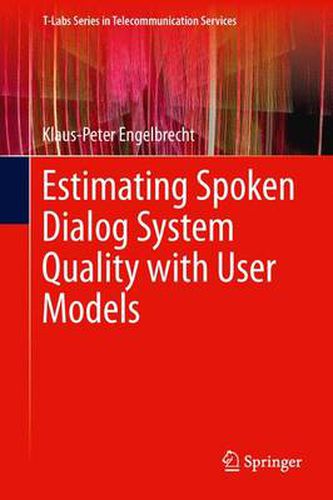Readings Newsletter
Become a Readings Member to make your shopping experience even easier.
Sign in or sign up for free!
You’re not far away from qualifying for FREE standard shipping within Australia
You’ve qualified for FREE standard shipping within Australia
The cart is loading…






This title is printed to order. This book may have been self-published. If so, we cannot guarantee the quality of the content. In the main most books will have gone through the editing process however some may not. We therefore suggest that you be aware of this before ordering this book. If in doubt check either the author or publisher’s details as we are unable to accept any returns unless they are faulty. Please contact us if you have any questions.
Spoken dialog systems have the potential to offer highly intuitive user interfaces, as they allow systems to be controlled using natural language. However, the complexity inherent in natural language dialogs means that careful testing of the system must be carried out from the very beginning of the design process.
This book examines how user models can be used to support such early evaluations in two ways: by running simulations of dialogs, and by estimating the quality judgments of users. First, a design environment supporting the creation of dialog flows, the simulation of dialogs, and the analysis of the simulated data is proposed. How the quality of user simulations may be quantified with respect to their suitability for both formative and summative evaluation is then discussed. The remainder of the book is dedicated to the problem of predicting quality judgments of users based on interaction data. New modeling approaches are presented, which process the dialogs as sequences, and which allow knowledge about the judgment behavior of users to be incorporated into predictions. All proposed methods are validated with example evaluation studies.
$9.00 standard shipping within Australia
FREE standard shipping within Australia for orders over $100.00
Express & International shipping calculated at checkout
This title is printed to order. This book may have been self-published. If so, we cannot guarantee the quality of the content. In the main most books will have gone through the editing process however some may not. We therefore suggest that you be aware of this before ordering this book. If in doubt check either the author or publisher’s details as we are unable to accept any returns unless they are faulty. Please contact us if you have any questions.
Spoken dialog systems have the potential to offer highly intuitive user interfaces, as they allow systems to be controlled using natural language. However, the complexity inherent in natural language dialogs means that careful testing of the system must be carried out from the very beginning of the design process.
This book examines how user models can be used to support such early evaluations in two ways: by running simulations of dialogs, and by estimating the quality judgments of users. First, a design environment supporting the creation of dialog flows, the simulation of dialogs, and the analysis of the simulated data is proposed. How the quality of user simulations may be quantified with respect to their suitability for both formative and summative evaluation is then discussed. The remainder of the book is dedicated to the problem of predicting quality judgments of users based on interaction data. New modeling approaches are presented, which process the dialogs as sequences, and which allow knowledge about the judgment behavior of users to be incorporated into predictions. All proposed methods are validated with example evaluation studies.